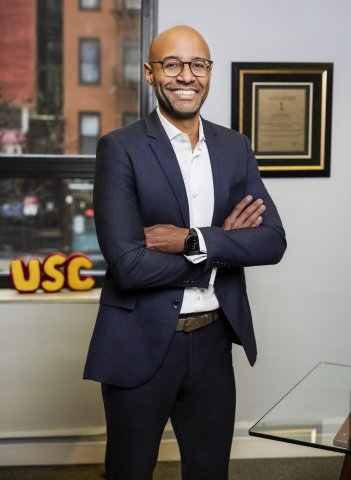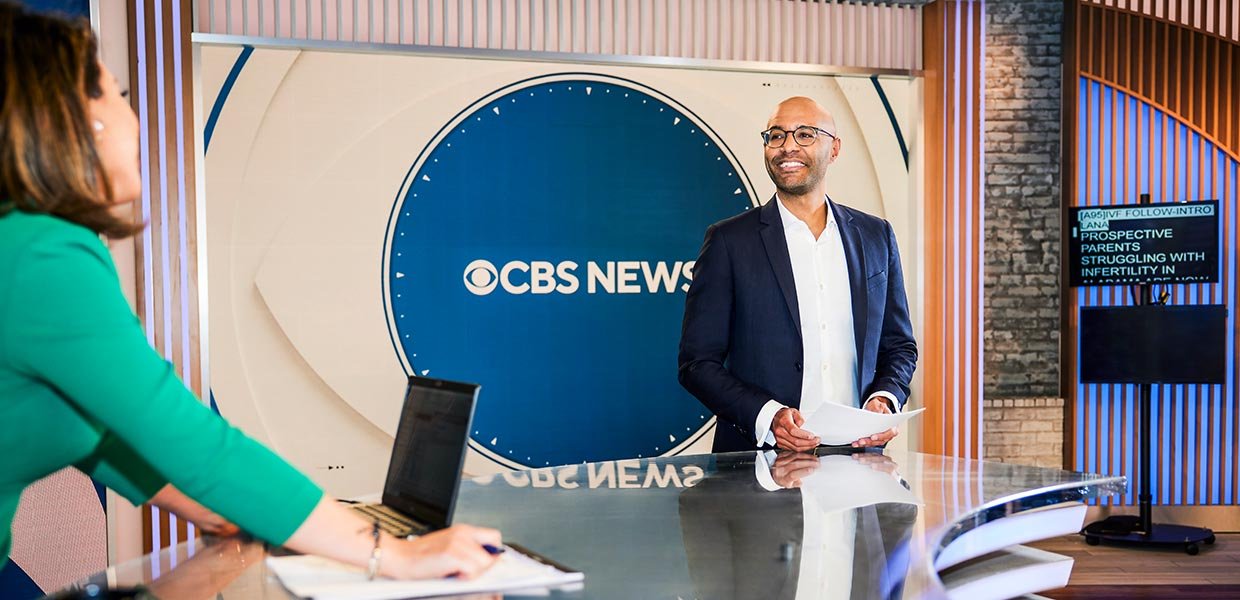In April 1992, when the streets of Los Angeles erupted in anger following the acquittal of four Los Angeles policemen in the savage beating of Rodney King, Anthony Galloway was just finishing junior high school.
“I remember watching the local news coverage and realizing that's what I want to do,” he said. “It was such an important story, and the reporters were out in the field at all these critical locations telling it. Journalism quickly became my calling, and I started as a reporter for my high school newspaper and ended as editor-in-chief.”
Galloway, now senior vice president of CBS News 24/7, CBS News' National Streaming Network, has built a career that blends the telling of meaningful, life-changing stories with an ever-evolving communications landscape.
“Journalism has both completely transformed and stayed the same,” he said. “Our commitment to factual journalism remains. But the way that we both produce the news and the way that people watch the news is vastly different. My job didn't even exist when I was in school.”
Earning his BA in journalism in 2001, Galloway credits USC Annenberg with preparing him to meet and exceed the demands of these rapid changes.

“When I first transferred to USC from UC Santa Barbara, we were learning and editing with videotape, but by the time I graduated, we were editing on Avid and shooting on digital formats,” he said. “When I started at NBC, they were still editing on tape. We had one computer in our newsroom that had the internet. Knowing how to use the programs and shoot digitally helped accelerate my trajectory. I was asked to travel to Ghana for President Obama's first trip to Sub-Saharan Africa and the reason why they asked me was because I could shoot, edit and produce all at the same time.”
Two of Galloway’s favorite USC Annenberg classes were taught by former KTLA anchor Terry Anzur and Good Day L.A. director Kim Crawford. At the time, both adjunct instructors were working full-time at their news stations. Galloway was impressed by the real-world applications and advice both instructors offered, including how to build a resume tape.
“Terry anchored the 10 o'clock news in Los Angeles, and yet she took time to teach us how to present on camera,” he said. “I also had producing professors who all were in the business but still taught us how to produce live news shows, how to write copy and how to make sure we're following standards and ethical guidelines. I am so honored to have been taught by them and inspired to give back, too.”
Galloway spent the first 15 years of his career at NBC News beginning as a news associate and ultimately serving as a supervising producer, managing the production of original short- and long-form digital video content for “Today,” “NBC Nightly News,” “Dateline” and NBCNews.com.
One project for Dateline, in particular, has stuck with him. For the episode, “'The Wrong Man,” Galloway chronicled the wrongful conviction of Ryan Ferguson in Missouri and the process of proving his innocence.
“That felt rewarding because I spent probably the better part of five years going back and forth from New York to Missouri to meet with him in prison, to tape interviews and to follow the case,” he said. “Ultimately, he got out, and here's a crazy thing, just two weeks ago I was in Cabo San Lucas because he was getting married, and he invited me to be one of the people who stood up with him at his wedding.”
Full-circle moments like these are what have continued to motivate Galloway after 25 years in the industry.
After NBC, he went on to be executive producer for mobile content at Vice Media, vice president of digital video programming at Condé Nast Entertainment and chief content officer at The Wall Street Journal.
There, he led video and audio production teams across three continents to produce the daily news, feature and long-form documentary programming for the WSJ’s digital video, social media, streaming and podcasting platforms. He also spearheaded WSJ’s partnerships with YouTube, Google and Twitter, and helped develop the organization’s first streaming television projects with Netflix and Apple TV+, as well as a daily podcast with Spotify’s Gimlet Media.
Now at CBS, Galloway is focused on deepening the connection with morning and prime-time audiences from both journalistic and programming perspectives. That means delivering for viewers during breaking news moments when they turn to his network and providing the original journalism and marquee broadcasts that CBS News is known for on a daily basis.
“We have reporters and correspondents in bureaus and stations across the country and around the world, so the tall order of the job is bringing all of that reporting onto one platform that truly represents the depth and breadth of CBS News,” he said.
In 2023, he welcomed a student cohort from USC Annenberg’s New York Maymester program to CBS News’ offices.
“USC Annenberg set me up for success in such an important way that now that I have the opportunity to go back and extol the virtues of what I learned,” Galloway said. “I get to be a connector and to open doors for folks. When you're able to achieve jobs like these, which you could have never dreamed of when you were a 20-year-old college student, then you want to be able to give back in the same way. I feel fortunate to be in a position where I can have some small impact potentially on students as they go through their journey like I did.”
Galloway hopes that the next generation of journalists help galvanize public trust in the media.
“The future of journalism is critical,” he said. “We must continue to tell factual stories and communicate information with context and factual analysis. The formats will continue to change the way we communicate and produce our stories, but the tenets of what we do will stand strong. Those who can provide some transparency and make clear the conclusions of their journalistic efforts and how they came to conclusions, will continue to thrive in this environment because that's what audiences are looking for, and that's what viewers gravitate to.”
